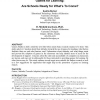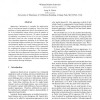194 search results - page 4 / 39 » Learning whom to trust: using graphical models for learning ... |
IWCM
2004
Springer
14 years 22 days ago
2004
Springer
We present a probabilistic framework for component-based automatic detection and tracking of objects in video. We represent objects as spatio-temporal two-layer graphical models, w...
CHI
2007
ACM
13 years 11 months ago
2007
ACM
Software developers must modify their programs to keep up with changing requirements and designs. Often, a conceptually simple change can require numerous edits that are similar b...
DIGRA
2005
Springer
14 years 27 days ago
2005
Springer
Games Studies is still a relatively new field where much basic research remains to be done. This study asks K-12 teachers about their attitudes towards the use of games for teachi...
CSCW
2006
ACM
14 years 1 months ago
2006
ACM
This paper presents a grounded theory of information sharing behavior of the users of a personal learning space. A personal learning space is an environment consisted of weblog, e...
SIBGRAPI
2009
IEEE
14 years 2 months ago
2009
IEEE
Appearance information is essential for applications such as tracking and people recognition. One of the main problems of using appearance-based discriminative models is the ambig...


